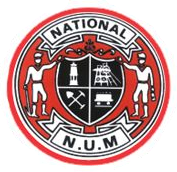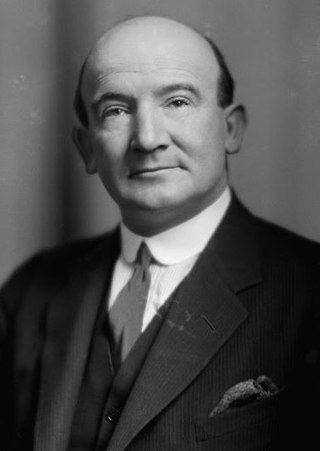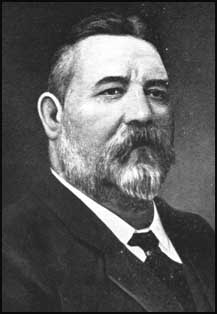
Syndicalism is a revolutionary current within the labor movement that, through industrial unionism, seeks to unionize workers according to industry and advance their demands through strikes, with the eventual goal of gaining control over the means of production and the economy at large through social ownership. Developed in French labor unions during the late 19th century, syndicalist movements were most predominant amongst the socialist movement during the interwar period that preceded the outbreak of World War II.

The 1926 general strike in the United Kingdom was a general strike that lasted nine days, from 4 to 12 May 1926. It was called by the General Council of the Trades Union Congress (TUC) in an unsuccessful attempt to force the British government to act to prevent wage reductions and worsening conditions for 1.2 million locked-out coal miners. Some 1.7 million workers went out, especially in transport and heavy industry.
Edward Hunter 2 June 1885 – 6 December 1959 was a Scottish socialist active in both Scotland and New Zealand. He was a trade union organiser, politician and a writer, and played a considerable role in the development of socialism in New Zealand. Born in Lanarkshire he was the son of a miner, which he later became himself at the age of 12 after receiving little formal education. He emigrated to the West Coast of New Zealand in 1906, already a committed socialist, influenced by Scottish left-wing thinkers such as Keir Hardie and Bob Smillie. As a miners' leader, Hunter became a leading member of the New Zealand Federation of Labour.

The National Union of Mineworkers (NUM) is a trade union for coal miners in Great Britain, formed in 1945 from the Miners' Federation of Great Britain (MFGB). The NUM took part in three national miners' strikes, in 1972, 1974 and 1984–85. Following the 1984–85 strike, and the subsequent closure of most of Britain's coal mines, it became a much smaller union. It had around 170,000 members when Arthur Scargill became leader in 1981, a figure which had fallen in 2023 to an active membership of 82.
The Australian labour movement began in the early 19th century and since the late 19th century has included industrial and political wings. Trade unions in Australia may be organised on the basis of craft unionism, general unionism, or industrial unionism. Almost all unions in Australia are affiliated with the Australian Council of Trade Unions (ACTU), many of which have undergone a significant process of amalgamations, especially in the late 1980s and early 1990s. The leadership and membership of unions hold and have at other times held a wide range of political views, including communist, socialist and right-wing views.
The Waihi miners' strike was a major strike action in 1912 by gold miners in the New Zealand town of Waihi. It is widely regarded as the most significant industrial action in the history of New Zealand's labour movement. It resulted in one striker being killed, one of only two deaths in industrial actions in New Zealand.

The 1951 New Zealand waterfront dispute was the largest and most widespread industrial dispute in New Zealand history. During the time, up to twenty thousand workers went on strike in support of waterfront workers protesting against financial hardships and poor working conditions. Thousands more refused to handle "scab" goods. The dispute was sometimes referred to as the waterfront lockout or waterfront strike. It lasted 151 days, from 13 February to 15 July 1951. During the lockout, the Watersiders' Union was deregistered and its funds and records were seized, and 26 local watersiders' unions were set up in its place.
Black Friday, in British labour history, refers to 15 April 1921, when the leaders of transport and rail unions announced a decision not to call for strike action in support of the miners. The epithet 'black' derives from a widespread feeling amongst labour radicals that the decision amounted to a breach of solidarity and a betrayal of the miners.

Patrick Charles Webb was a New Zealand trade unionist and politician.
The Miners' Federation of Great Britain (MFGB) was established after a meeting of local mining trade unions in Newport, Wales in 1888. The federation was formed to represent and co-ordinate the affairs of local and regional miners' unions in England, Scotland and Wales whose associations remained largely autonomous. At its peak, the federation represented nearly one million workers. It was reorganised into the National Union of Mineworkers in 1945.

William Abraham, universally known by his bardic name, Mabon, was a Welsh trade unionist and Liberal/Labour politician, and a member of parliament (MP) from 1885 to 1920. Although an MP for 35 years, it was as a trade unionist that Abraham is most well known. Initially a pioneer of trade unionism, who fought to enshrine the principle of workers' representation against the opposition of the coal-owners, he was regarded in later life as a moderate voice believing that disputes should be solved through conciliation rather than industrial action. This drew him into conflict with younger and more militant leaders from the 1890s onwards. Although the defeat of the miners in the Welsh coal strike of 1898 was a clear defeat for Mabon's strategy, his prestige was sufficient to ensure that he became the first president of the South Wales Miners' Federation which was established in the wake of the dispute. Abraham was noted for his powerful speaking voice, and was a renowned orator in English and Welsh.

James Thomson "JT" Bain was a socialist and syndicalist in colonial South Africa.

William Edward Parry was a New Zealand politician and trade unionist.

The Great Strike refers to a near general strike that took place in New Zealand from October 1913 to mid-January 1914. It was the largest and most disruptive strike in New Zealand's history. At its height, it brought the economy of New Zealand almost to a halt. Between 14,000 and 16,000 workers went on strike, out of a population of just over one million.

Matthew Charlton was an Australian politician who served as leader of the Australian Labor Party (ALP) and Leader of the Opposition from 1922 to 1928. He led the party to defeat at the 1922 and 1925 federal elections.
The Council of Non-European Trade Unions (CNETU) was a national trade union federation bringing together unions representing black African workers in South Africa.
The history of trade unions in the United Kingdom covers British trade union organisation, activity, ideas, politics, and impact, from the early 19th century to the present.

The Industrial Workers of the World (South Africa) or IWW (SA) had a brief but notable history in the 1910s-20s, and is particularly noted for its influence on the syndicalist movement in southern Africa through its promotion of the IWW's principles of industrial unionism, solidarity, and direct action, as well as its role in the creation of organizations such as the Industrial Workers of Africa and the Industrial and Commercial Workers' Union.

In April 1912 and July 1913, two "unity conferences" were held to discuss and determine the future of organised labour in New Zealand. The events mainly centred around the debate over whether industrial action or political activity should be the means of achieving the aims of workers and additionally to unite the "moderate" and "militant" factions within the labour movement. Whilst neither conference fully unified the labour movement, it laid a framework of co-operation that would later assist during the creation of the current New Zealand Labour Party in 1916.
The 1908 Blackball miners' strike was industrial action that happened when seven miners in the small town of Blackball, on New Zealand's West Coast, were dismissed for taking longer than their allocated fifteen minutes, for lunch. This was one of many issues that were causing discontent within the coal-mining industry that was set up as a series of capitalist enterprises to meet the shipping needs of Britain as an imperial power. When Blackball township was established, the mining company provided low-quality living and working conditions for the miners and after the town became populated by immigrants with union experience overseas, some of the grievances that eventually resulted in the strike emerged. The strike has been seen as a formative event in New Zealand history because of the successful outcome for the miners from the eleven-week strike by the use of direct action and organised unionism. This was the first real challenge to the Arbitration Court, set up under legislation by the Liberal Government in 1894 to support mediation in industrial disputes, and highlighted the difficulties of getting a resolution because of the wide range of political, social and cultural factors that resulted in a degree of intransigence by both the miners and the mine company. A number of the leading strikers subsequently became leaders in the political labour movement.












